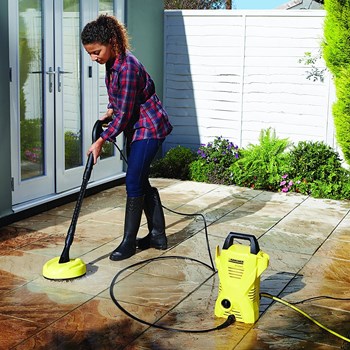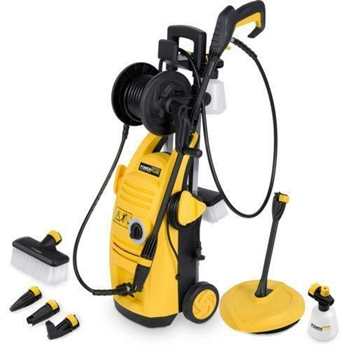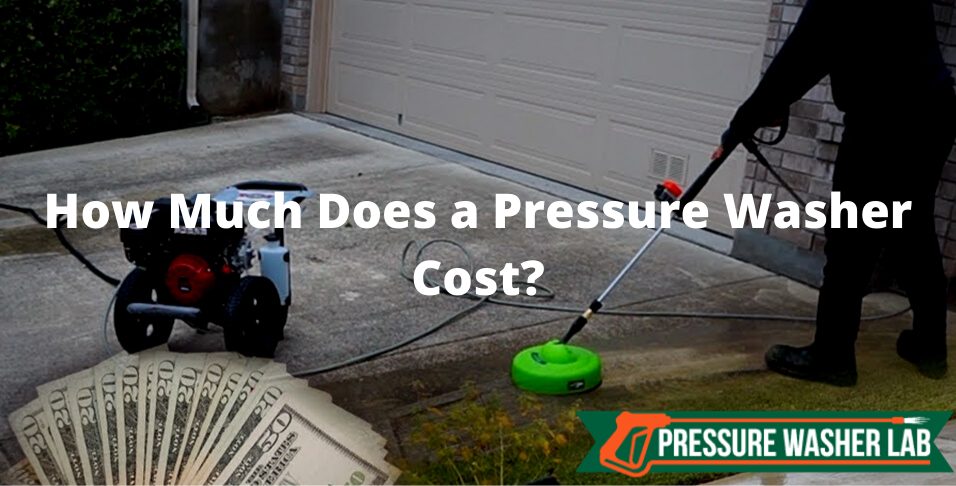The cost of a pressure washer varies between $90 and $10,000, as power washer models have different purposes and features that influence their price. A pressure washer can be more expensive or more affordable depending on a wide range of factors such as type, PS rating, accessories included in the package, engine, pump, and other performance features. How much a pressure washer costs and how these factors influence its price are discussed in detail below.
What Influences The Cost Of A Pressure Washer?
1. Pressure Washer PSI, GPM, and CU
The pressure washer PSI rate is an indicator that measures the pressure generated by the unit’s engine. The name is an abbreviation for Pounds per Square Inch.
The power washer GPM rate indicates how much water is coming out of the unit while in use and is an abbreviation of Gallons Per Minute.
The CU of a pressure washer indicates the total power of a unit. The CU is calculated by multiplying the PSI and the GPM.
 The price of a pressure washer is influenced primarily by the PSI rating, and secondly by its GPM rate. Power washers that have high PSI rates usually deliver high GPM levels as well, therefore their CU is higher. Units with higher PSIs are more expensive because their main components, such as engines/motors, and pumps need to be more powerful and more robust.
The price of a pressure washer is influenced primarily by the PSI rating, and secondly by its GPM rate. Power washers that have high PSI rates usually deliver high GPM levels as well, therefore their CU is higher. Units with higher PSIs are more expensive because their main components, such as engines/motors, and pumps need to be more powerful and more robust.
The pressure washer PSI rate gives the operator information about its use. Pressure washing a car, for example, requires the use of a maximum pressure rate between 1500 PSI and 1900 PSI. Other tasks, such as cleaning concrete surfaces like driveways or patios might require between 2000 PSI and 2800 PSI. More information on PSI ratings and how much is required for different tasks can be found in our article ‘What size pressure washer do I need?’.
2. Pressure Washer Type
The price of a pressure washer is highly influenced by the type of unit a user is purchasing. This is because the type determines the power of a pressure washer. The differences between pressure washer prices according to their type are detailed below.
2.1. Gas Pressure Washer Prices
Gas power washers are more expensive than electric pressure washers because they are usually more powerful. Compared to electric or battery-powered units, gas pressure washers can handle medium to heavy-duty cleaning tasks with ease, depending on the model. The components of a gas power washer are replaceable and more expensive than the ones that other types of units are equipped with.
Gas pressure washer engines can be more expensive or more affordable, depending on their features. Some manufacturers produce engines with low oil systems that alert the users that lubricant levels are too low to safely operate the power washer.
The pressure washer pumps that gas units are equipped with also differ between models. Power washers that have triplex pumps are more expensive than those with axial or wobble pumps, as they are more powerful and solid. The materials that the pumps are made of also make a difference when it comes to how much a power washer costs. Pumps with brass or aluminum heads are more expensive than the ones made of steel. Pressure washer pumps equipped with a thermal relief valve are more expensive than those that lack this feature.
2.1.1 2300 – 3200 PSI
Residential light to medium-duty gas power washers cost between $280 – $550. The difference in price is given by the details discussed above. These units are relatively robust and easy to store compared to the heavy-duty models.
2.1.2 3300 – 4500 PSI
Homeowners who need to perform DIY heavy-duty cleaning jobs can find gas pressure washers in a wide price range, from $300 to $2000. This high variation is given by the manufacturer. Brands such as Simpson or Generac come with higher prices because their power washer parts are durable and some engines are manufactured by Honda or Kohler. The frame construction of these units is also sturdier compared to medium-duty cleaning machines.
2.1.3 4500 PSI or Above
Gas pressure washers with such a high-pressure rate are usually used by professionals, but residential users can also operate them with caution. These units cost between $1200 and $5000.
2.2. Electric Pressure Washer Prices
Electric pressure washers are more affordable than gas-powered units not just because they are not as powerful but also because their components are not as expensive. An electric pressure washer motor costs less than a gas-powered engine, for example. The same applies to pumps.
There is a difference among electric pressure washer motors, as well. Units that have brushless motors are more expensive than the ones with brushed motors. The brushless ones are more powerful and come with reduced energy consumption and reduced heating levels, which means that the lifespan of such a pressure washer is longer.
2.2.1 1500 – 1900 PSI
Light-duty electric power washers cost around $100 – $200, depending on the model and the brand. These units are designed to be used for easy cleaning chores around the house like pressure washing outdoor furniture but are also ideal for car washing, window cleaning, and wood deck washing.
2.2.2 2000-3000 PSI
Electric power washers that are rated between 2000 PSI and 3000 PSI are meant for medium-duty cleaning and are ideal for cleaning sidewalks, fences, garage floors, and more. The cost of an electric medium-duty power washer varies between $300 and $450.
2.2.3 3000 – 3600 PSI
Heavy-duty electric power washers are the most expensive in the line and usually cost between $400 and $800. These units are suited for cleaning rough surfaces such as driveways, oil-stained concrete, and preparing surfaces for a painting procedure.
2.3. Battery pressure Washer Prices
Battery pressure washers cost between $100 and $550. These models are usually more affordable compared to other types of cleaning units. Even though they come with high mobility levels, these portable pressure washers are not very powerful. Such a pressure washer usually comes with a maximum pressure rate of around 1500 PSI.
2.4. Hot Water Pressure Washer Prices
The price of a hot water power washer varies between $800 and $6000. Hot water pressure washers are among the most expensive units on the market because they have an extra feature, that of heating water. These units also need an extra part, the hot water tank, and some of their attachments need to be heat-resistant, such as their hoses.
2.5. Commercial Pressure Washer Prices
Pressure washers designed for professional use are more expensive than their residential rivals because they have sturdier constructions. Commercial pressure washers are designed to be used every day without deteriorating while keeping performance levels at a required standard. This is the reason why such units are more expensive than pressure washers designed for home use. The price of commercial pressure washers can go up to $10,000.
3. Included Pressure Washers Accessories
 Pressure washer prices are influenced by the quality and the type of accessories that they are accompanied by. The most common include attachments are high-pressure hoses, pressure washer trigger guns, wands, and a few nozzles. Most brands include 5 nozzles, but there are some models that are accompanied only by 3. Other power washer attachments that can be found in a pressure washer package are pressure washer brushes, brooms, and turbo nozzles.
Pressure washer prices are influenced by the quality and the type of accessories that they are accompanied by. The most common include attachments are high-pressure hoses, pressure washer trigger guns, wands, and a few nozzles. Most brands include 5 nozzles, but there are some models that are accompanied only by 3. Other power washer attachments that can be found in a pressure washer package are pressure washer brushes, brooms, and turbo nozzles.
The quality of the attachments that come with a cleaning unit also influences how much a pressure washer costs. Power washer hoses, for example, differ in quality. The materials that these hoses are made of are essential to determine if they are long-lasting or not. The most sought-after pressure washer hoses are made of non-marring materials and are usually flexible and abrasion-resistant. These materials include polyester or steel braiding and polyurethane outer jackets.
4. Pressure Washer Features
Pressure Washer Onboard Hose Reel
A pressure washer that has an onboard hose reel provides a more comfortable operation, prolongs the lifespan of the hose, and is easier to store than a power washer that doesn’t have a reel. This is why this feature increases the price of a pressure washer.
Pressure Washer Onboard Detergent Tank
Pressure washers without an onboard detergent tank are more affordable, but make pressure washing a lot harder. The operator needs to purchase an external detergent tank that will have to be carried around everywhere, making the use of a pressure washer very uncomfortable. Onboard soap tanks increase comfort during pressure washing, therefore units with such a feature are more expensive.
Power Washer Adjustable Pressure Settings
Being able to adjust the pressure on a power washer is a factor that adds to the price of the unit because it provides faster cleaning and fewer worries for the operator. Some units have a built-in controller with pre-settings, and others are compatible with adjustable nozzles that allow the user to control the pressure.
Pressure Washer Total Stop System or TSS
Pressure washers equipped with a total stop system have a longer lifespan than units that don’t, this is why this factor raises the price of a machine. The TSS turns off the motor of the pressure washer when the operator releases the trigger of the gun. This action prevents the pump from reaching high temperatures which, in return, expands the unit’s lifespan. This feature is also responsible for reduced energy consumption.

